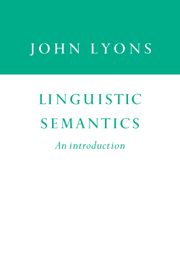Book contents
- Frontmatter
- Contents
- Preface
- List of symbols and typographical conventions
- Part 1 Setting the scene
- Part 2 Lexical meaning
- Part 3 Sentence-meaning
- Part 4 Utterance-meaning
- 8 Speech acts and illocutionary force
- 9 Text and discourse; context and co-text
- 10 The subjectivity of utterance
- Suggestions for further reading
- Bibliography
- Index
10 - The subjectivity of utterance
Published online by Cambridge University Press: 05 June 2012
- Frontmatter
- Contents
- Preface
- List of symbols and typographical conventions
- Part 1 Setting the scene
- Part 2 Lexical meaning
- Part 3 Sentence-meaning
- Part 4 Utterance-meaning
- 8 Speech acts and illocutionary force
- 9 Text and discourse; context and co-text
- 10 The subjectivity of utterance
- Suggestions for further reading
- Bibliography
- Index
Summary
INTRODUCTION
Having looked at the notion of context in detail in the preceding chapter, we can now return to the question of speech acts and locutionary agency. We shall begin with reference – the relation that holds between linguistic expressions and what they stand for in the world (or the universe of discourse) on particular occasions of utterance. We shall then take up a particular kind of reference, deixis, which depends crucially upon the time and place of utterance and upon the speaker's (more precisely, the locutionary agent's) and the addressee's roles in the utterance-act itself.
We shall then consider the grammatical categories of tense and aspect, neither of which is universal, but both of which, together or separately, are found in many unrelated languages throughout the world. As we shall see, tense, unlike aspect, is a referential (and more specifically deictic) category.
Another grammatical category that is closely connected with tense (and in some languages is found independently of tense) is mood. As the term ‘mood’ would suggest, there is a historical association between the grammatical category of mood, as this is traditionally defined, and what is referred to as modality in modern logic and formal semantics. There are, however, important differences between the way in which modality (and mood) are handled, typically, in present-day formal semantics and the way in which mood and modality have been described in traditional grammar.
- Type
- Chapter
- Information
- Linguistic SemanticsAn Introduction, pp. 293 - 342Publisher: Cambridge University PressPrint publication year: 1995



